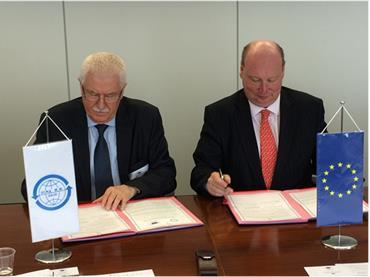International relations
The Lisbon Treaty has assigned a stronger role to the European Commission as regards external representation in matters of shared EU/national competence like transport. As set out in the White Paper on transport of 28 March 2011, the EU will reinforce its international transport cooperation on railway policy. The EU seeks to extend external market rules to its neighbours. To this end, it acceded to the Organisation for International Transport by Rail (OTIF) on 1 July 2011.
Similarly, the EU may foresee accession to the Organisation for cooperation between railways (OSJD) once the new legal framework of organisation is adopted. Moreover, a cooperation arrangement between DG Mobility and Transport and OSJD was signed on 1 March 2016. The successfully completed negotiation of a Western Balkan Transport Treaty will prepare this region for the integration of their railways with those of the EU on the basis of fair competition and mutual access to infrastructure. The EU also promotes its approach globally, including the opening of transport service and product markets, which features in all relevant international negotiations.
The Commission set out its strategies for international relations in its Communication of 7 July 2011 'The EU and its neighbouring regions: A renewed approach to transport cooperation'. In the short term, the EU seeks to specify the 1520/1524 mm track gauge system in the standards (technical specifications for interoperability) developed by the European Railway Agency (ERA). 1520/1524 mm track gauge system has been specified in technical specifications relating to rolling stock — locomotives and passenger rolling stock, infrastructure and energy subsystems as of 1 January 2015. It will promote the deployment of the European Rail Traffic Management System (ERTMS) in neighbouring countries as well as foster the participation of potential candidates and neighbouring countries in the activities of the ERA. In the long run, the Commission intends to study trans-shipment (from 1520 mm to 1435 mm and vice versa) practices at connecting points and try to improve them, including via research activities. It will also explore the possibility of an opening of the rail market with European Neighbourhood Policy (ENP) countries. Most importantly the Commission strives for the signature of the Transport Community Treaty with partners in the Western Balkans.
Railway policy features prominently in the EU's policy towards its closest neighbours. By means of the South East European Transport Observatory based in Belgrade, seven regional partners cooperate in the transport domain to prepare for accession to the EU. (Consult the Cosmos project on good practice on measures for developing intermodal rail freight services on the South East European axis.)
The Chairman's conclusions of the West Balkan 6 summit held in Vienna on 27 August 2015 aims at, among other things, open access for freight trains on the Oriental East Med Corridor, a maintenance system to do away with all stretches of poor condition on the SEETO regional core network and an extension of the TEN-T core network to the West Balkans region.
The EU represents its Member States in all matters of rail transport policy at the United Nations Economic Commission for Europe (UNECE). 37 UNECE Members States signed a Joint Declaration at the ministerial meeting in February 2013. This declaration aims at General Terms and Conditions for Euro-Asian rail freight transport. Moreover, the Joint Declaration proposed the integration of the two European rail transport law systems of Intergovernmental Organisation for International Carriage by Rail (OTIF) and the Organisation for Co-Operation between Railways (OSJD).
Competitiveness of the rail supply industry
The Commission launched a forum (expert group on the competitiveness of the EU rail supply industry) to analyse the main challenges facing the sector. This initiative followed both the June 2016 European Parliament resolution on the competitiveness of European RSI and the Commission's response. 6 meetings took place in 2018 and 2019.
The forum is an official Commission expert group in line with the decision on rules for Commission expert groups.
In October 2019, the EU expert group endorsed a report with several recommendations to maintain the global leadership of the rail supply industry. The recommendations envisage additional measures while ensuring synergies with the policy measures already in place to meet the current challenges of the rail supply industry.
They cover 10 policy areas, including digitalisation, innovation, skills and training, internal market, standardisation, EU public procurement, EU supporting mechanisms, access to markets and finance for SMEs, access to international procurement market and intellectual property rights. The recommendations address the entire rail sector, EU countries, the European Commission, European standardisation organisations and EU bodies.
Brexit
Policy and other related documents

